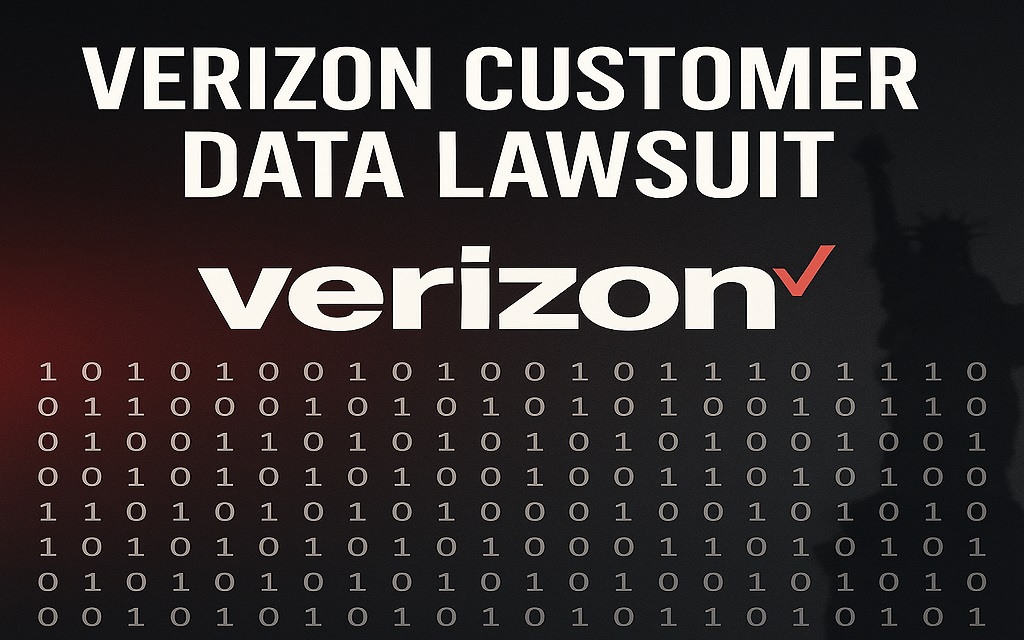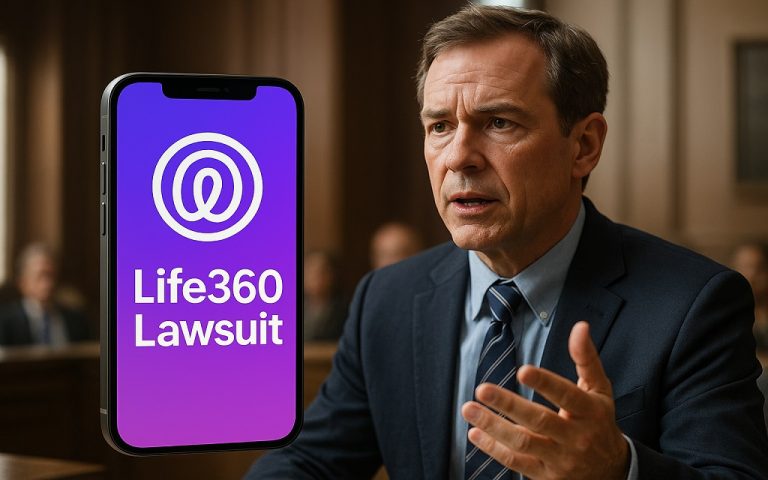Verizon, one of the largest telecommunications companies in the United States, is now the subject of a significant class-action lawsuit. The complaint alleges that Verizon sold sensitive customer data, including browsing history and location information, to third parties without obtaining user consent. The Verizon customer data lawsuit has caught the attention of privacy advocates, regulatory bodies, and millions of Verizon customers.
If proven true, the case could redefine consumer data rights, opt-in privacy compliance, and how telecom companies monetize user behavior. This article outlines the key points of the Verizon customer data lawsuit, what is at stake, how you may be affected, and the potential legal and regulatory outcomes that could follow.
Why Is Verizon Facing a Class Action Lawsuit Over Customer Data?
You should be aware that Verizon is currently the subject of a major privacy lawsuit. A group of customers claims the company sold personal data without proper consent. The lawsuit says Verizon shared browsing history, location details, and other sensitive information.
It is essential to know that this data was reportedly sold to advertisers. Consumers argue they never gave permission. Reports first appeared in early 2025. Legal experts say the claims may violate federal and state privacy laws.
According to Teiss UK, the lawsuit alleges that Verizon is using deceptive practices. The company allegedly enrolled users into a program called “Custom Experience.” Users say they were never clearly informed.
What Customer Data Is Verizon Accused of Selling?
You should understand the types of data mentioned in the lawsuit. Plaintiffs say Verizon shared details like:
- Mobile browsing history
- Location tracking and GPS routes
- App usage behavior
- Video content access logs
- Customer identifiers and device data
The lawsuit alleges that third-party advertisers utilized this information. Many customers say they never opted in.
A 2023 Pew Research study shows that 79% of Americans feel they lack control over how companies use their data. This supports claims that users may not have agreed knowingly.
Did Verizon Seek Consent From Its Users?
You need to know how consent plays a central role in this lawsuit. Verizon argues that its privacy policies explain the data sharing. Customers disagree. They say the policies used vague language and offered no straightforward opt-out process.
It is essential to check your Verizon settings. Many users reported being auto-enrolled. Most say they were not given a meaningful choice.
According to the FTC, companies must offer clear notice and consent before selling user data. Failure to do so may constitute a deceptive trade practice.
How Does the “Custom Experience” Program Work?
You should learn how the Custom Experience program tracks behavior. Verizon collects data on what you search, which apps you open, and where you go.
Customers in the lawsuit claim Verizon pushed them into this program without clear notice. The opt-out page was difficult to find. Some users never received emails or alerts.
Verizon says the program personalizes services. Critics argue it is a way to monetize personal information without informed approval.
Which Laws Could Verizon Have Violated?
You must be familiar with the applicable legal standards. The lawsuit references several privacy and consumer protection laws. These include:
- The California Consumer Privacy Act
- The Federal Trade Commission Act
- The Communications Act under Title II
If Verizon failed to follow these rules, penalties may apply. Under the CCPA, companies are required to provide a “Do Not Sell My Personal Information” link. Customers say Verizon failed to do that.
A 2024 report from the Electronic Frontier Foundation highlights that telecom companies face growing scrutiny. Privacy law violations are becoming more common.
Must Read: Rowdy Oxford Lawsuit: Timeline, Allegations, Court Ruling, and Industry Fallout
What Timeline Does the Case Follow?
You should track key dates in the lawsuit. The timeline helps explain how the case grew. Here is a brief timeline highlighting how the case unfolded:
| Date | Event |
|---|---|
| Early 2025 | Privacy watchdogs begin reporting on Verizon’s ad-tech partnerships |
| March 2025 | Lawsuit filed in U.S. District Court alleging unauthorized data sales |
| April 2025 | Class certification requested by plaintiff attorneys |
| May 2025 | FCC and FTC open parallel reviews into Verizon’s consumer data policies |
| June 2025 | Verizon issues a public statement denying wrongdoing |
The lawsuit is still active. Legal teams are gathering documents and user reports. As of mid-2025, pre-trial motions and evidence discovery are underway.
What Is Verizon’s Official Response?
It is necessary to hear both sides. Verizon says the lawsuit is without merit. The company claims it followed all legal guidelines.
A company spokesperson stated that its privacy policies were transparent. Verizon says users could opt out at any time.
Privacy advocates disagree. They argue that proper consent requires active opt-in, not hidden default settings.
The Washington Post reported that similar practices cost AT&T $60 million in fines in 2020. Verizon could face similar outcomes if the court finds violations.
How Can You Tell If You Are Affected?
You should check your Verizon account. If you use Verizon’s mobile or broadband services, you may be part of the lawsuit.
Affected users often:
- Saw ads linked to recent searches
- Joined the Custom Experience program without notice
- Had no chance to opt out of data sharing
Verizon customers can visit the privacy section of their online account. There, you can disable data sharing programs manually.
You should also monitor emails and letters from law firms. Class members will likely receive a notice if the lawsuit proceeds.
What Could Customers Receive From the Lawsuit?
You may be eligible for compensation if the lawsuit is successful. Class action lawsuits often include cash payouts or service credits.
Potential outcomes include:
- Refunds or account credits for affected users
- Court-ordered policy changes at Verizon
- Fines imposed by regulatory agencies
According to Law360, similar lawsuits against Meta and Google resulted in multi-million-dollar settlements. Those cases also involved data privacy.
How Can You Protect Your Data in the future?
You should take steps to limit how companies use your data. Verizon offers options to adjust your privacy preferences. You can:
- Visit your Verizon privacy dashboard
- Turn off Custom Experience and marketing settings
- Use browsers that block tracking
- Install ad-blockers on mobile and desktop devices
You should also carefully read the company’s privacy policies. Many terms are hidden deep in legal language. It is essential to locate the sections regarding third-party sharing.
What Should You Do If You Want to Join the Lawsuit?
You should contact the law firm handling the case. You can also look for updates in legal news sources. If the court approves the class action, you may be added automatically.
In most class actions, no action is needed to receive compensation. However, you should file a claim if the court or legal team provides instructions.
Ensure your contact details are up to date in your Verizon account. Class action notices often arrive by mail or email.
How Does the Verizon Case Affect the Telecom Industry?
You should be aware that this case may establish a new legal precedent. If the court rules against Verizon, other companies may face similar lawsuits.
Experts say telecom providers collect more behavioral data than ever. The Verizon lawsuit highlights the importance of explicit consent.
According to the Center for Democracy and Technology, 61% of Americans want stricter limits on data sales. Lawmakers may push new rules after high-profile cases like this.
FAQs
What is the Verizon lawsuit about?
You should know it accuses Verizon of selling customer data without explicit consent.
Is Verizon allowed to sell my data?
It depends on consent. If you disagreed clearly, the sale may be illegal.
How do I stop Verizon from using my data?
Go to your account privacy settings. Turn off all behavioral tracking features.
Can I sue Verizon directly?
You can join the class action. Contact a consumer protection lawyer if you need assistance.
Is there a deadline to join?
You should follow case updates. The court will announce deadlines once the class is approved.
Conclusion of Verizon Customer Data Lawsuit
You deserve control over your personal information. Telecom companies, such as Verizon, must respect privacy rights. This lawsuit shows how unclear consent can lead to legal trouble.
You should take action now. Review your settings, understand your rights, and closely follow legal updates. Data privacy matters more than ever.
If you believe Verizon has misused your information, consider consulting a lawyer. A short consultation could protect your future.
Disclaimer: This article provides a general overview of the Verizon Customer Data Lawsuit, based on publicly available information, and is intended for informational purposes only. It does not constitute legal advice.
Musarat Bano is a content writer for JudicialOcean.com who covers lawsuits, legal news, and general legal topics. Her work focuses on research-based, informational content developed from publicly available sources and is intended to support public awareness. She does not provide legal advice or professional legal services.




